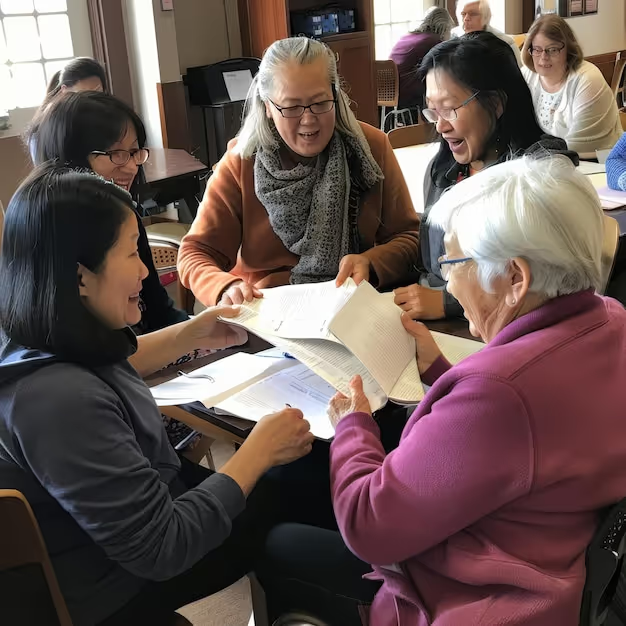NHTD Waiver and Independent Living
Discover how the NHTD waiver and independent living empower elderly individuals and their caregivers effectively.

Understanding NHTD Waiver Program

Overview of NHTD Waiver
The NHTD Waiver Program, short for Nursing Home Transition and Diversion Waiver, is a home and community-based initiative in New York designed to assist Medicaid-eligible seniors and individuals with physical disabilities. This program provides comprehensive support, allowing participants to remain in their communities instead of transitioning to nursing homes or institutional settings. The NHTD Waiver operates under section 1915(c) of the Social Security Act.
The core philosophy of the NHTD Waiver Program is centered around the belief that individuals with disabilities and seniors should have the same rights as others. This includes making choices about their lives, managing risks, and engaging in meaningful activities while ensuring their health and well-being [2].
Goals of the Program
The primary goal of the NHTD Waiver Program is to empower participants by promoting their right to choose whether to engage in the waiver, helping them identify services they need, and allowing them to select their own service providers. This autonomy is critical in ensuring that individuals can navigate their care and support systems effectively.
The services provided under the NHTD Waiver include a Service Coordinator responsible for developing personalized care plans. Additionally, the program offers essential services such as Home and Community Support Services (HCSS) for basic activities of daily living, Community Transitional Services (CTS) to assist individuals moving from nursing homes back to the community, and essential Skilled Nursing services for medication management and health monitoring.
Service Coordinators involved in the NHTD Waiver Program are required to adhere to strict conflict-of-interest requirements, ensuring that participants maintain their independence and autonomy while receiving support [2].
The NHTD Waiver Program also aids those residing in or planning to reside in assisted living programs or other licensed congregate care settings by facilitating their transition to safe, community-based living, supported by Medicaid and waivered services [4].
Eligibility for NHTD Waiver
Understanding eligibility for the NHTD Waiver Program is vital for elderly individuals and caregivers considering participation. There are specific criteria that need to be met to qualify for the program, focusing on Medicaid requirements and the need for nursing home-level care.
Medicaid Requirements
To be eligible for the NHTD Waiver, individuals must first be enrolled in Medicaid, which is a combined federal and state program that assists those with limited income in covering medical, health, and social service costs. Medicaid acts as a primary requirement for joining the NHTD Waiver Program or applying for nursing home care.
Applications for the NHTD Waiver must ensure that individuals do not reside in an Assisted Living Program (ALP) or certain managed care programs, as this is intended to prevent duplication of services.
Nursing Home Level of Care
An essential component of the eligibility assessment for the NHTD Waiver involves confirming that the applicant requires services typically provided in a nursing home setting. This includes undergoing an assessment to determine the individual's needs for support and their level of care.
The eligibility criteria also state that potential participants must be willing to engage in the program and meet additional assessment criteria. The assessment evaluates personal strengths, risks, and goals to create a personalized service plan aimed at enhancing independence and community integration [1].
For more details about the eligibility assessment process, you can read our guide on eligibility assessment for nhtd waiver. Additionally, if you are preparing to apply, refer to our comprehensive nhtd waiver application guide for assistance.
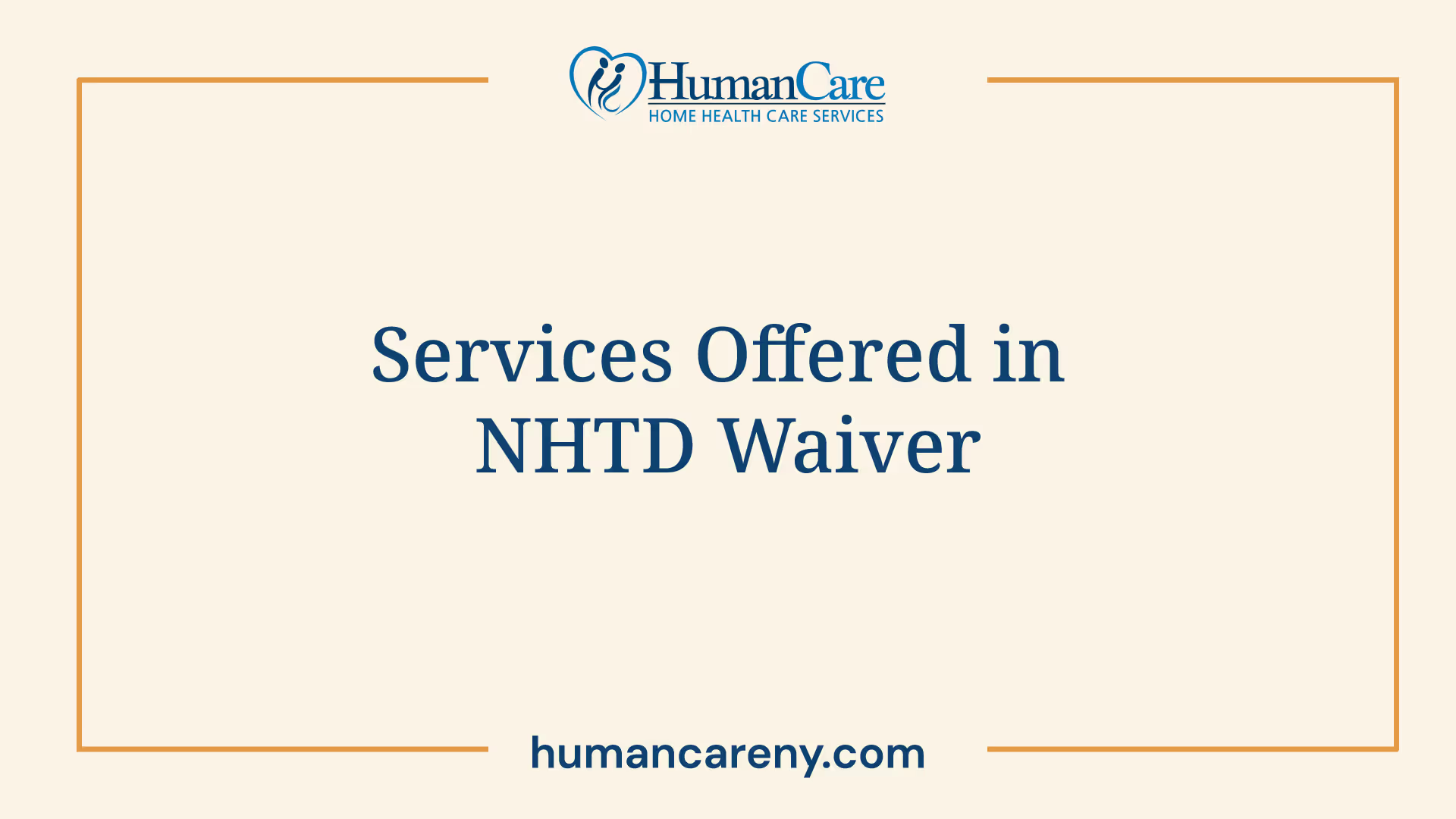
Services Offered in NHTD Waiver
The NHTD Waiver program provides a comprehensive range of services designed to support individuals with disabilities and seniors in living independently within their communities. The services offered focus on enhancing personal autonomy while ensuring health and well-being. Below are the key services included in the program.
Home and Community Support
Home and Community Support Services (HCSS) are essential components of the NHTD Waiver program. These services assist individuals with basic activities of daily living, such as bathing, dressing, meal preparation, and household chores. The program aims to provide support in the least restrictive environment, allowing participants to maintain their independence while living in their own homes or community settings.
Service TypeDescriptionPersonal CareAssistance with daily personal activitiesMeal PreparationPreparing and planning nutritious mealsHousekeepingHelp with light cleaning and household tasks
Community Transitional Services
Community Transitional Services (CTS) are designed to support individuals transitioning from nursing homes back to community living. This service helps to create a seamless transition by providing resources such as financial assistance for security deposits, utility setups, and furniture. The goal is to empower individuals to reclaim their independence and establish a home in a community setting.
Transition SupportDescriptionFinancial AssistanceSupport for security deposit and utilitiesHousing AssistanceHelp finding suitable housing optionsMoving SupportAssistance with relocation logistics
Skilled Nursing Services
The NHTD Waiver program also includes access to Skilled Nursing services. Licensed nurses provide essential care such as medication management and health monitoring for participants. These services ensure that health needs are met while allowing individuals to reside safely in their homes or communities.
Skilled Nursing ServicesDescriptionMedication ManagementOverseeing and administering prescribed medicationsHealth MonitoringRegular assessments of health status and needsCare CoordinationCollaboration with other care providers
Overall, the NHTD Waiver program emphasizes a person-centered approach tailored to the individual's strengths, needs, choices, and goals [2]. This fosters independence and community inclusion while ensuring quality support. For more information about the application process for these services, refer to our nhtd waiver application guide or learn about the eligibility assessment for nhtd waiver.
Participant Empowerment and Autonomy
The NHTD Waiver Program emphasizes participant empowerment and autonomy, allowing individuals to take charge of their care. This section discusses the decision-making rights of participants and the responsibilities they hold within the program.
Decision-Making Rights
Participants in the NHTD Waiver Program have significant decision-making rights. They are empowered to choose the services and service providers that best meet their needs. This flexibility means they can develop service plans tailored to their unique strengths and preferences. By fostering this level of control, the program promotes independence, community inclusion, and engagement in meaningful activities [1].
Key aspects of decision-making rights include:
Participant Responsibilities
With empowerment comes responsibility. Participants in the NHTD Waiver Program are encouraged to take an active role in their care. This includes engaging in the planning process and adhering to the agreed-upon service plans. Participants should communicate openly with their providers, maintaining accurate records of their care options and reporting any changes in their condition or needs.
Responsibilities for participants include:
By understanding and embracing these rights and responsibilities, participants can enhance their autonomy and improve their quality of life while using the nhtd waiver and independent living services. For those looking to learn more about the application process, check out our NHTD waiver application guide and our guide on what to expect from NHTD home visit.
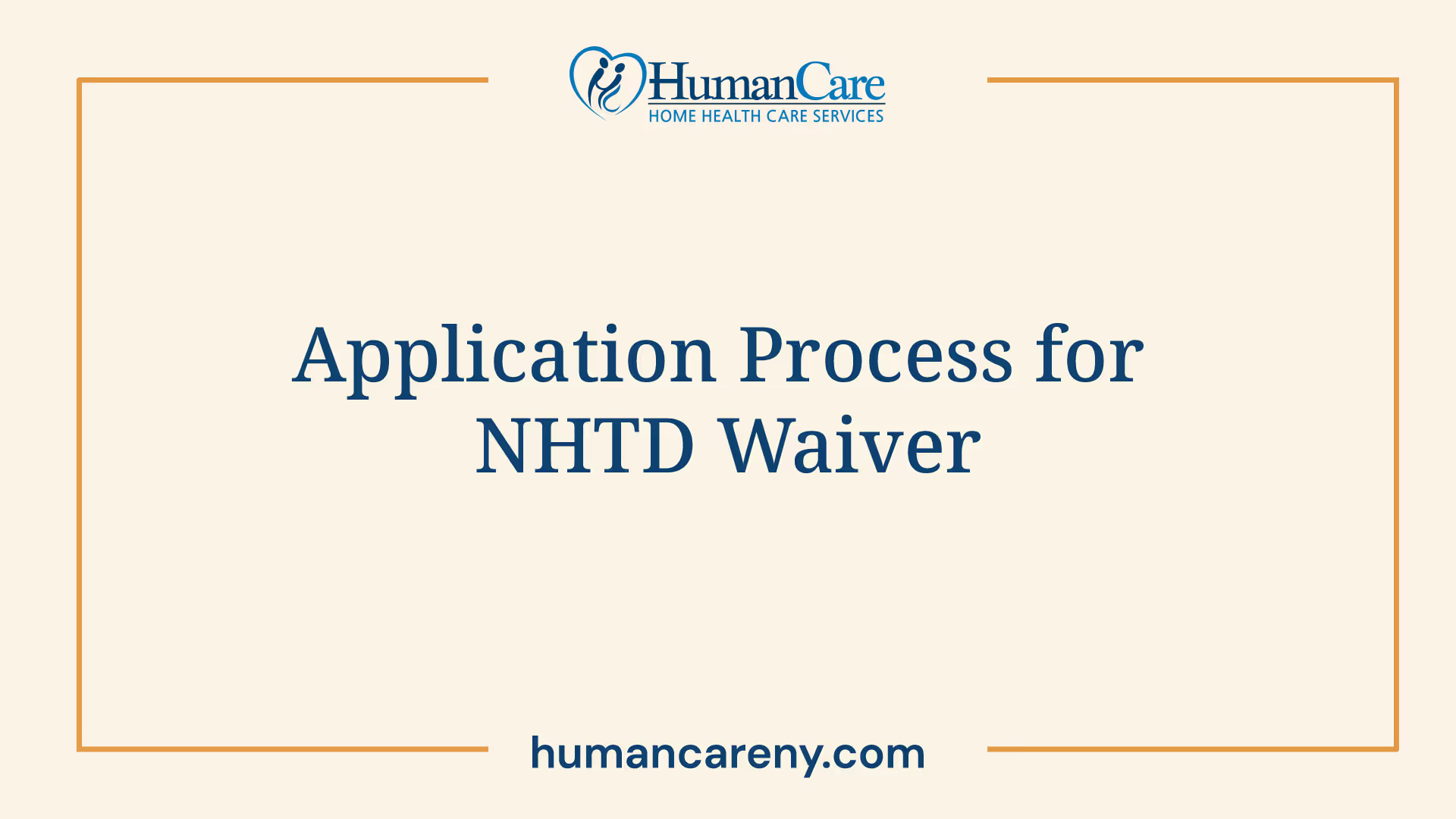
Application Process for NHTD Waiver
Navigating the application process for the NHTD Waiver program can seem challenging, but understanding the steps involved can help. This section outlines the steps to enrollment and the application review process.
Steps to Enrollment
To enroll in the NHTD Waiver Program, individuals must follow a structured three-step approach:
The entire enrollment process may take approximately 2 to 4 months, though the timeframe can vary based on individual circumstances.
StepDescription1. Reach OutContact RRDC to express interest2. AssessmentEvaluate eligibility for the waiver program3. Care PlanDevelop a personalized service plan
Application Review Process
Once the application is submitted, it undergoes a thorough review process conducted by the RRDC. This review includes the following steps:
For those seeking insights into what to expect during this process, including home visits and assessments, the article on what to expect from NHTD home visit provides valuable information. Individuals can also refer to the nhtd waiver application guide for detailed instructions and resources.
By familiarizing themselves with these steps, elderly individuals and their caregivers can better navigate the application process for the NHTD Waiver program, fostering independent living and improved quality of life.
Success Measures in NHTD Program
The success of the NHTD program can be assessed through various measures that reflect the goals of community inclusion and the personal satisfaction of participants.
Community Inclusion
Community inclusion is a fundamental aspect of the NHTD waiver program. The program encourages participants to engage in community activities, which fosters a sense of belonging and promotes social interaction. Through various services, participants are empowered to take part in meaningful activities that enhance their quality of life.
Some services designed to promote community inclusion include:
Service TypeDescriptionCommunity ActivitiesOpportunities for social engagement and participation in local events.Housing SubsidiesFinancial support for state-funded housing to facilitate independent living.
While the provision of housing is not classified as a waiver service, participants may have access to a state-funded housing subsidy to help support their living arrangements within the community, contingent upon fund availability.
Personal Satisfaction
Personal satisfaction among participants serves as a critical measure of the success of the NHTD waiver program. The program emphasizes individual empowerment and aims to meet personal needs and goals. High levels of satisfaction are indicative of how well participants find fulfillment in their everyday lives, including their ability to make choices and engage in self-reliant activities.
To gauge personal satisfaction, participants can evaluate factors such as:
Satisfaction FactorDescriptionQuality of ServicesThe effectiveness and availability of services provided under the program.Autonomy in Decision-MakingThe ability to make personal choices regarding care and daily activities.Engagement in ActivitiesThe level of involvement in community and productive activities.
Participants who are satisfied with their experiences in the program often report a higher sense of well-being, enhanced community ties, and the ability to lead independent lives. This commitment to participant satisfaction is part of the NHTD program’s overarching goal to ensure health and welfare while supporting autonomy and decision-making [2].
For more information about the NHTD waiver, check out our NHTD waiver application guide and the eligibility assessment for NHTD waiver.
References
[2]:
[3]:
[4]:
[5]:
[6]:
[7]:
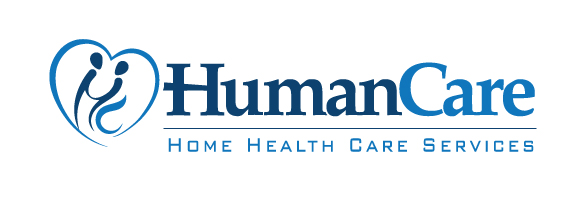

.avif)






.avif)
.avif)
.avif)
.avif)




































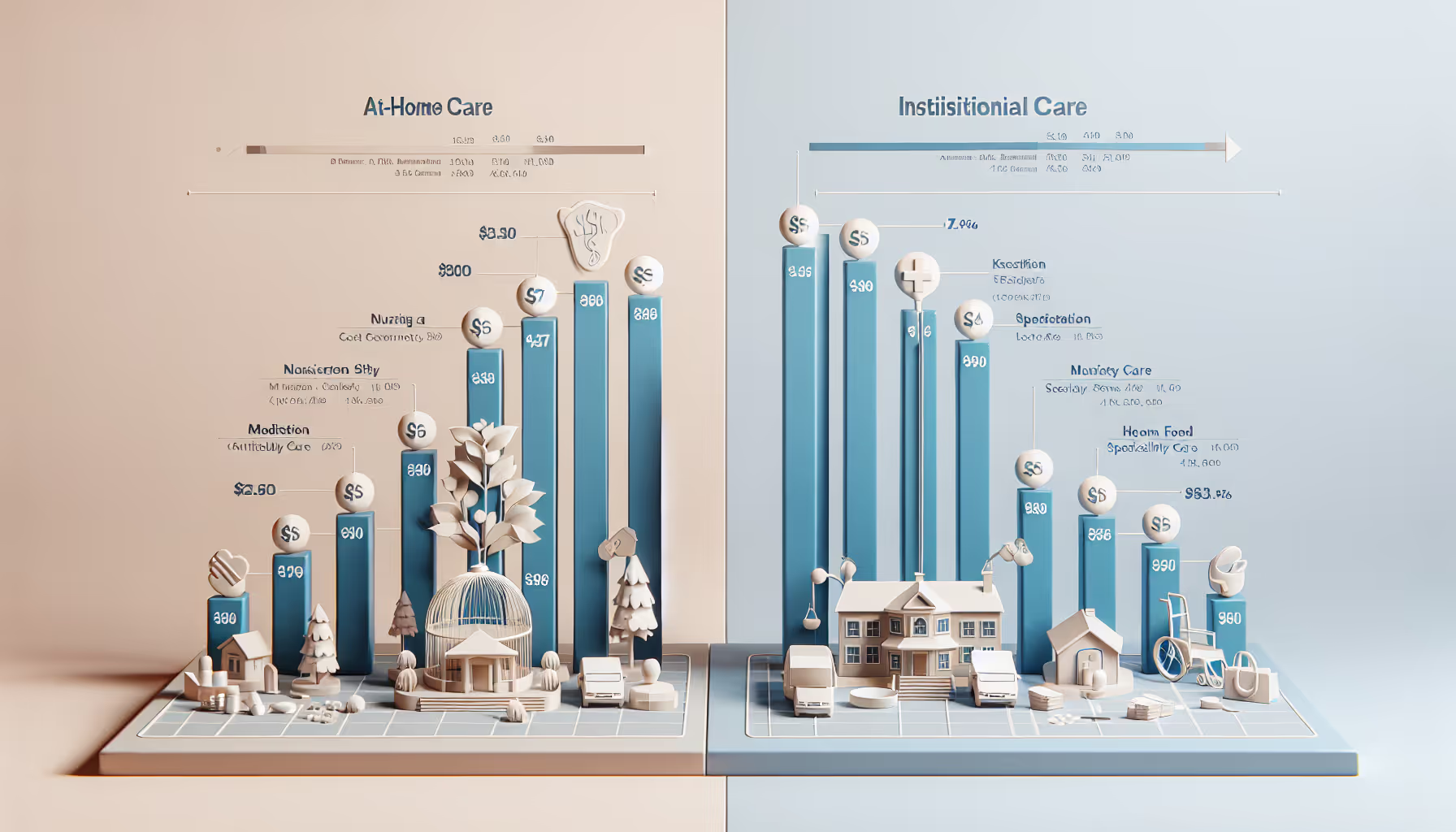
















.avif)










